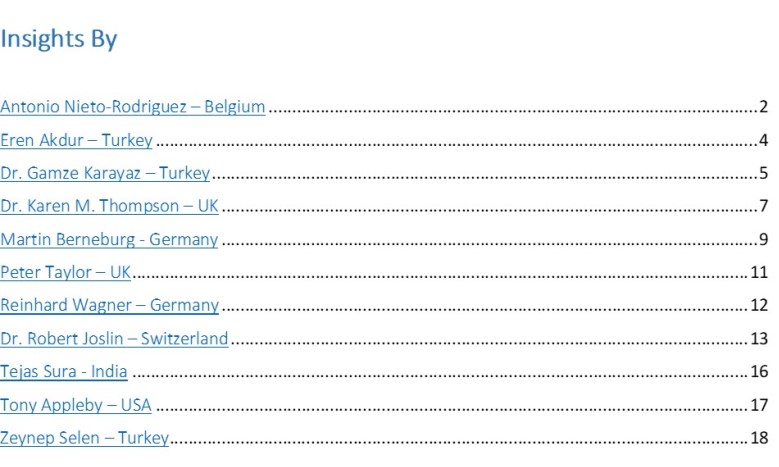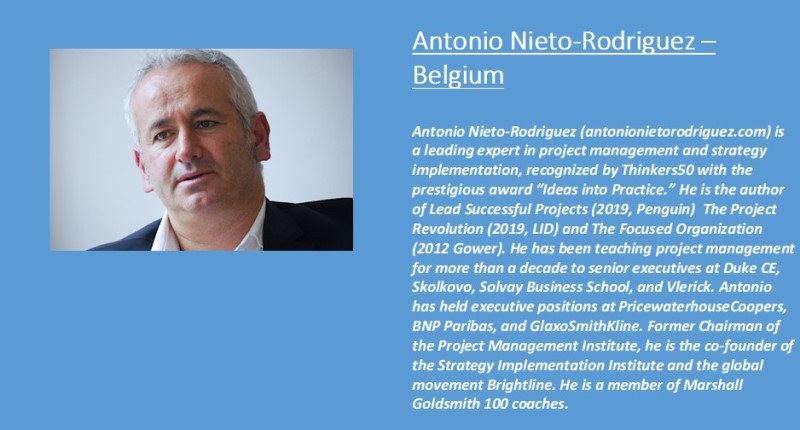INSIGHTS REPORT
By Ipek Sahra Ozguler
International Correspondent
Istanbul, Turkey
Coronavirus (Covid -19) has changed everything.
Our personal lives.
Our business lives.
This report brings together the useful insights of a wide number of project management leaders around the world (Belgium, India, Germany, Switzerland, Turkey, UK, USA), and provides important detail that can be used to help develop future forecasts, plans and improve decision making.


Time to Re-Invent Project Management
It is not the first time that the world experiences a crisis. We all remember the terrible 9/11 or the financial crisis in 2008 that swiped away millions of jobs in a matter of months. Yet, we have never experienced something similar to the coronavirus. It is unprecedented the speed and the severe impact that it has had across the world, not only on the health of millions of individuals and on the healthcare systems across the world, but also with tremendous consequences in the global economy and society at large. For which its full effects remain still unknown. The current situation is only (partially) comparable to the times of the Second World War, and the later recovery of a world devastated, through the Plan Marshall and other multi-billion reconstruction initiatives.
Leadership is always important in the tough and the good times, yet it is even more critical when a global crisis hits billions of people in a matter of weeks. And even more so when we come from some years in which leadership had lost most of its face value, where we have seen the worst face of leadership close to us: the selfishness, the hypocrisy, the manipulation, …
I firmly believe that we have a unique opportunity to both re-invent leadership and re-invent project management. That we go back to the initial values and human believes and that we improve them to address the current and future needs of our planet. And the best way to do it is through inspirational projects and strategic initiatives that will help organizations and individuals navigate through the crisis and transform to come up stronger.
From a practical and project leadership perspective, this is a unique opportunity for leaders and project managers to take action, step-up, build the competencies, and move towards a more agile organization and more straightforward project management practices and approaches.
Project management methods have tended to be too complex to be easily understood and applied by non-experts. Modern project management methods were developed primarily in the 1970s and 1980s by expert practitioners (at the beginning, mostly engineers) for practitioners (also predominantly engineers). The central assumption of the project management methods has been that documenting every aspect of a project in detail will provide a high level of control of the planned activities during the implementation of the project. Many project managers ended up producing massive numbers of documents and swathes of paperwork, leading to an overall feeling that the role was primarily administrative.
In contrast, widely used management disciplines are often linked to a few simple frameworks that can be easily understood and applied, not only by managers but also by the majority of individuals. Porter’s Five Forces and value chain analysis help to make strategy a key area for every organization to apply.
Under these circumstances, it is not surprising that we saw the rise of agile, triggered by the Agile Manifesto, written in February 2001 by 17 independent-minded software practitioners. That movement brought project management close to its end.
In late 2019, research from Gartner claimed that 80 % of today’s Project Management tasks would be eliminated by 2030 as Artificial Intelligence takes over, which we should see as a call for action to redefine the future of our profession.
If we act now, there is a good chance that project management becomes one of the most sought after skills by organizations in the new world.
More…
To read entire interview, click here
How to cite this report: Ozguler, I. S. (2020). Insights Report: Project Management After Covid-19. PM World Journal, Vol. IX, Issue V, May. Available online at https://pmworldlibrary.net/wp-content/uploads/2020/04/pmwj93-May2020-Ozguler-project-management-after-covid-19-Report.pdf
About the Editor

Ipek Sahra Ozguler
Istanbul, Turkey
![]()
Ipek Sahra Ozguler graduated from the Istanbul University with a Bachelor of Science degree in Computer Engineering and from Middle East Technical University with an MSc degree in Software Management. As a project manager, she has more than 10 years’ experience in various areas such as portfolio management, program management, project management, software management, business analysis. She became a certified PMP in January, 2012 and a certified SCRUM Master in 2014.
She has managed a variety of projects across manufacturing, defence, FMCG (Cola Cola), insurance (Euler Hermes), audit (Deloitte), telecommunication, ICT and aviation sectors and gained broader insights. In addition, she has worked as international correspondent for the PM World Journal since 2014.
Ipek is the creator and editor of the highly acclaimed book, The Perspective of Women Project Management Professionals, interviews with leading female PM experts and professionals around the world. The book was published in March 2020 and is available here.
Ipek is based in Isanbul and can be contacted at ipeksahra@gmail.com. Her portfolio is published at the http://ipeksahra.strikingly.com/.
To view other works by Ms. Ozguler, visit her author showcase in the PM World Library at http://pmworldlibrary.net/authors/ipek-sahra-ozguler/









